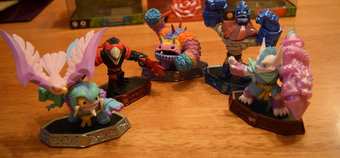Here at Everybody Plays, we know finding games for your family isn't as easy as it should be. That's why we've strived to ensure every game we review on the site also comes with a parent's guide, so that, along with being a great place to find games for yourself, we can give you all the information you need when picking a game for your children (or younger relatives) too. And today, those parent's guides are getting an upgrade.
The basic format will be staying much the same as it is, providing all the info parents (even technophobic ones!) need to know, so they can judge if a game's right for their family. Bundling a compact, plain English parent's guide, that explains what you actually have to do in a game, along with a description of any mature content, we give parents everything they need to understand what a game's all about, without being preachy. And now, we're adding our EPAL ratings to the mix too.
When it comes to buying a game, there's always plenty of advice about content - in the UK and Europe, there's a PEGI rating on the box, and in the US, an ESRB rating, to give an indication of what sort of age the game is aimed at in terms of content alone. But that doesn't tell you whether your child will actually be able to do it. A game rated PEGI 3+ could still be way too complicated for a 3 year old to cope with - especially if it's a text heavy adventure. How many times have you bought a game home, only to have your kid tell you 30 minutes later that they "can't do it"? It's something that's happened to us a fair few times - but with the EPAL ratings, it should never happen again!
The EPAL ratings, or Everybody Plays Ability Level ratings, are an at a glance guide to a game's complexity, that let you know how involved the game is, and how experienced your child would have to be to cope. As every child is different, and learns at different speeds, the EPAL ratings standardise things in a much simpler way. Taking into account everything from the amount of reading involved to the complexity of the puzzles; from the amount of save points to the quality of the tutorials, our EPAL ratings break a game's complexity down into five easy levels, giving parents the confidence they need that not only is a game right for their child - but they'll be able to do it too.
Here's our quick guide to what each EPAL Level means.

These games are as easy as they come. An EPAL Level 1 game will have minimal levels of writing (beyond the odd bit on the menus), and very simple, very easy pick up and play gameplay, of the sort anyone - even someone who's never played a game before - could get to grips with. From games for little ones like Learning with the PooYoos and Peppa Pig, to games that even grandparents can enjoy, like Wii Sports, Nintendogs, Cooking Mama and Angry Birds, simple, pick up and play gameplay is the rule here.

Games with an EPAL Level 2 rating have a little bit more depth, but are still very easy to pick up and play. From slightly more complex mini-game collections like Mario & Sonic at the Winter Olympic Games and Wii Party U, to accessible, arcade-style racing games like Mario Kart, and even some simple platform games like Kirby's Epic Yarn, games under this category often give you more of an objective to complete than the free form fun found in Level 1, and give you more options to get there. Still, games in this category will hold your hand quite tightly, and have extensive tutorials, or a very shallow learning curve, and little in the way of reading. This category also takes in simple puzzle games like Arkanoid, Peggle, Bejeweled and Tetris.

Games in EPAL Level 3 start to get that little bit more complex. Bigger, with more freedom, larger worlds, more choices, and slightly more complex controls, these are games that will offer a challenge - but one that won't leave you frustrated for too long. From more challenging platform games like Little Big Planet, that ask for more precision and quicker reactions, to puzzlers that require a fair amount of forward planning and insight, or timing, like Mario vs Donkey Kong, Plants vs Zombies, or Lumines, EPAL Level 3 games give your brain a bit more of a workout. Still, while their controls may be more complex, and ask more of your child's motor controls, there's nothing too awkward about Level 3 games. Simple, role playing games, whether button mashing dungeon crawlers, or with turn based battles like Pokemon, sports games like FIFA, and beat 'em ups also come under this category. If a game's in this category that otherwise has simple gameplay, it's a fair bet it's been put here because of the amount of reading involved. Games in this section may require children to be a confident reader, and from here on in, your child will need to be a fluent reader to cope. Be sure to check specific parental reviews for more details, as many now also include sample sentences, so you can check if your child can understand it before buying!

Games with an EPAL Level 4 rating start to ask a lot more of players. With some having more complex, dual analogue control schemes, others may offer large, open worlds to explore as you see fit (like Ni No Kuni and the Tales of games), puzzles that require some amount of basic physics or more complex logic (like using a see-saw to fling a block into the air, or setting fire to a spider's web to defeat the spider boss at the end of it, as in Luigi's Mansion 2), with less, or sometimes nothing in the way of prompts to help you out. Challenging you to use your intuition and experiment more than Level 3 games, Level 4 games are aimed at more confident players, taking in slightly more complex role playing games (like Kingdom Hearts) that may ask you to manage a team of characters, or "grind" to increase your level by beating smaller enemies (like Bravely Default); simple strategy games that require plenty of forward planning, or music games that require a great sense of rhythm and quick reactions (like Guitar Hero). Many first person shooters will also be EPAL level 4, although parents should check the mature content rating for content suitability.

EPAL Level 5 games are a broad bunch, and are aimed at two tribes - more accomplished players looking for a challenge, and those who prefer to use their brain rather than their trigger finger. From games that are famed for their punishing difficulty level, like Castlevania and Mega Man, to "bullet hell" shooters that fill the screen with projectiles for you to avoid, some EPAL Level 5 games will push your reactions to their limit. Others, like point and click adventures such as Professor Layton, push you in a different way, requiring a very specific kind of logic, and an analytical mind, that younger children may find too complex. Challenging strategy games, that require you to think several turns in advance, and plan your every move very carefully, lest you come a cropper, would also come under this category. One for those looking for a challenge, either mentally or physically, then.


















